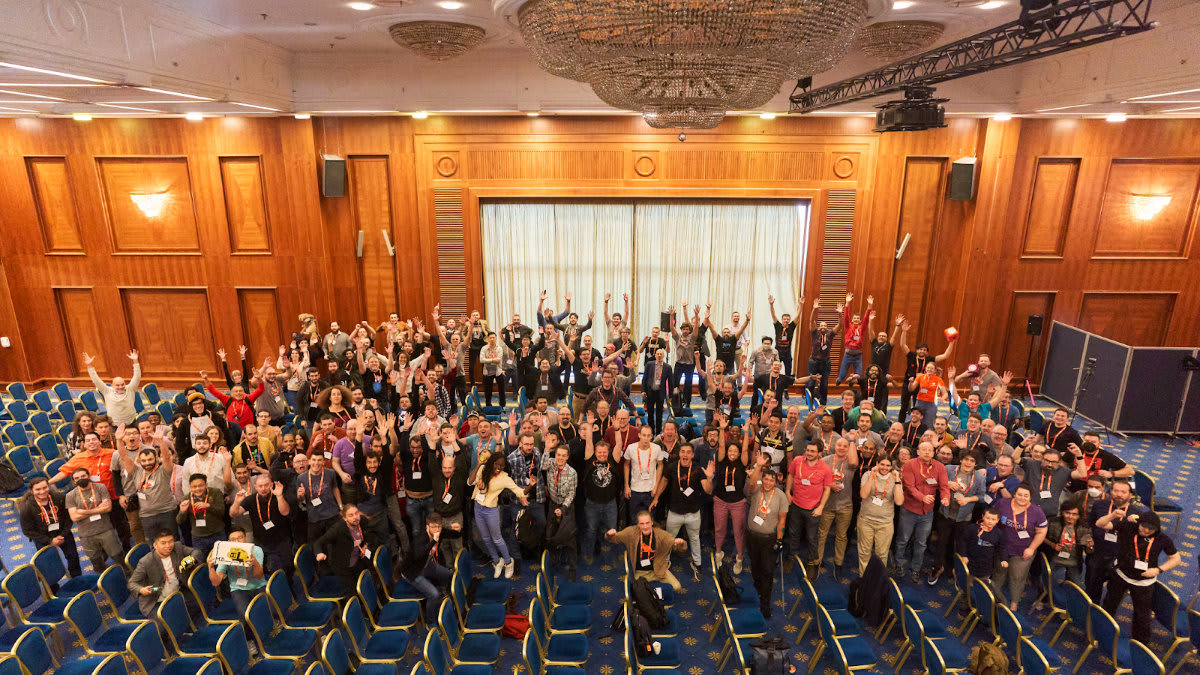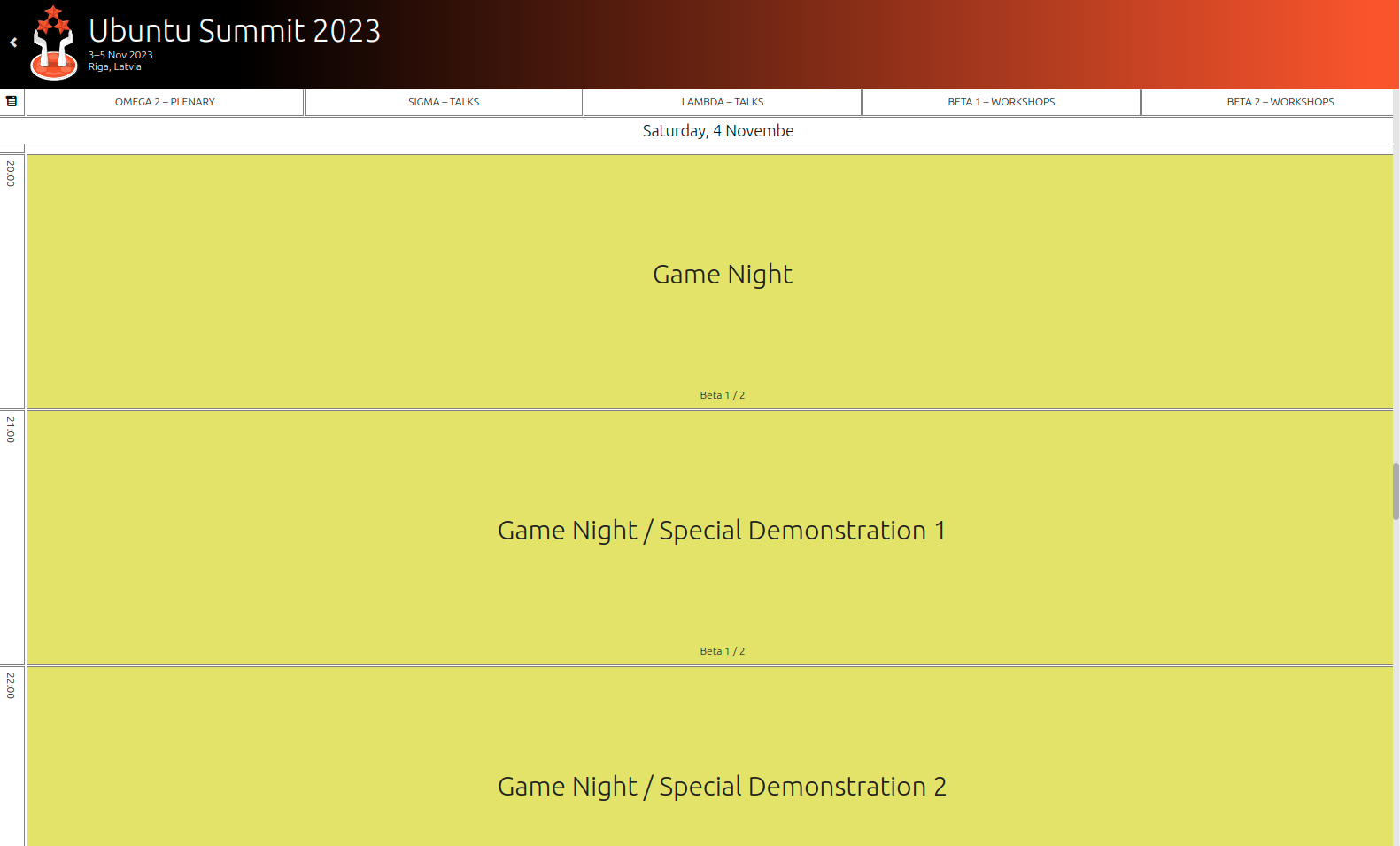Ubuntu Summit
This weekend the Ubuntu Summit begins in Riga, Latvia. I originally had no plans to attend until a recent change in circumstance, and a late space became available.
The Ubuntu Summit is “an event focused on the Linux and Open Source ecosystem, beyond Ubuntu itself. Representatives of outstanding projects will demonstrate how their work is changing the future of technology as we know it.”.
Essentially it’s a conference-style event with multiple tracks hosting speakers talking about Ubuntu and Linux-adjunct topics.
UDS
Back in the day, Canonical would host an “Ubuntu Developer Summit” (UDS) every six months. From 2007 through 2012, I attended at least ten of these ranging from Sevilla (Spain), Boston (USA) to Brussels (Belgium), Orlando (USA), and finally the last UDS in Copenhagen (Denmark).
In those days almost everyone employed at Canonical would attend, along with sponsored community members, partners, and others from the wider ecosystem. A UDS would be a week-long stay in an often decent, sometimes quirky hotel and conference facility. On many occasions, the UDS would be preceded or followed (or both) by an internal Canonical-only product or engineering sprint.
That meant Canonical employees would be away from home for two to three weeks, at least twice a year. Both the sprint and UDS schedule was packed with 45-60 minute sessions, spread across many rooms and floors of the facility. Employees would rush to a room, start a session, moderate conversations, try to keep it on track, take notes, assign actions then wrap up and rush to the next session.
There were also presentations to senior management at the sprints, which served as knowledge sharing, project planning, and checkpoints to ensure everything was on track for the next release of Ubuntu - or other products and projects. It was pretty intense, and exhausting.
Ubu-flu
Employees (and the community) would frequently return with the so-called “Ubu-flu”, wiped out for days after returning from the event. With two weeks away, then “swap days” to take as a vacation in lieu of the middle weekend, plus ubu-flu, these events could put a dent in engineer productivity time.
This was especially true of the six-month cycle between the .10 release in October, and the .04 release in April the following year. Productivity often took a nose-dive, what with the release in October, a two-week sprint then other major holidays like US Thanksgiving and the whole Christmas period. I’m amazed we ever delivered anything in an LTS, it’s no wonder they’re rarely packed with features.
UDS was always pretty exciting and exhausting. But for a remote-first company, it was seen as a necessary way to keep everything on track, sync up with teams, and do some intense work. It was also an opportunity to meet (often for the first time) your colleagues, socialise and bond. The social side of UDS was greatly missed when Canonical stopped holding them after 2012. The community felt it hard, too.
Virtual Ubuntu Summits
Long before The Event made everyone an expert on remote working and virtual events, we tried Virtual UDS as an alternative to the in-person event. We used contemporary online tools like the Ubuntu Wiki, Etherpad, Google Hangouts Meet (or whatever it was called back then), and IRC (RIP in Peace) to collaborate online. We were pretty good at it, but it wasn’t the same.
When someone attends an event in meatspace, they’re “present” for the whole time. Back then everyone was pretty focused on the topic in-hand during a session. People also talk about how important the hallway track is at an in-person event, where people can have ad-hoc conversations.
With the virtual event spread over multiple days, it’s hard to get contributors engaged. They may have their laptop open, watching the stream, but they’ll also be reading email, or get interrupted by colleagues (if in an office) or family (if at home).
Many of the streams had little participation and pitiful post-event viewer numbers. It might work better now, post The Event, but back then, people weren’t into it.
Ubuntu Summits return
In 2022, Canonical announced a new summit, taking place in Prague from November 7th to 9th (Monday to Wednesday). I didn’t attend, but I’m told by friends who did, that it was a great event, which rekindled some of the spirit of UDS from the past.
It must have been good because they’re doing it again!
Ubuntu Summit 2023
That brings us to this week. Canonical announced the upcoming Ubuntu Summit 2023 in Riga, Latvia. Interestingly the event schedule is running from Friday (afternoon) to Sunday (evening). It looks like this fits in the weekend between two internal Canonical events, rather than being tacked on after or before.
As I booked late and had no expectation of attending, I hadn’t submitted any talks, which makes a change from most events I go to. So my preparation essentially consists of checking the Ubuntu Summit Schedule and clicking the fancy little 🌟 next to the talks I like the look of.
I will be taking a laptop in case there are opportunities for hacking, and to update my blog. But other than that, I have no significant responsibilities, which will make a nice change.
I am looking forward to meeting old friends from Canonical, and new people from the community I’ve not seen in person before. I’m also quite intrigued by this “Special Demonstration” on Saturday evening during Game Night.
Maybe see you there. 🛫


